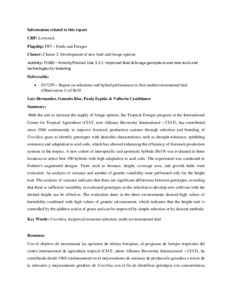Report on selections and hybrid performance in first multienvironmental trial
With the aim to increase the supply of forage options, the Tropical Forages program at the International Center for Tropical Agriculture (CIAT; now Alliance Bioversity International – CIAT), has contributed since 1968 continuously to improve livestock production systems through selection and breeding of Urochloa grass to identify genotypes with desirable characteristics such as drought-tolerance, spittlebug resistance and adaptation to acid soils, which has allowed enhancing the efficiency of livestock production systems in the tropics. A new cohort of interspecific and apomictic hybrids (Br19) was evaluated in three locations to select best 300 hybrids with high adaptation to acid soils. The experiment was conducted in Federer's augmented designs. Traits such as biomass, height, coverage area, and growth habit were evaluated. An analysis of variance and another of genetic variability were performed only for the height trait. The analysis of variance indicates that there are significant differences between genotypes, revealing that there is sufficient variability in evaluated genotypes so the selection to develop new cultivars with the desired height can be effective. The evaluation dates in the three environments showed high values of heritability combined with high values of genetic advancement, which indicates that the height trait is controlled by the additive action of genes and can be improved by simple selection or by descent methods.

